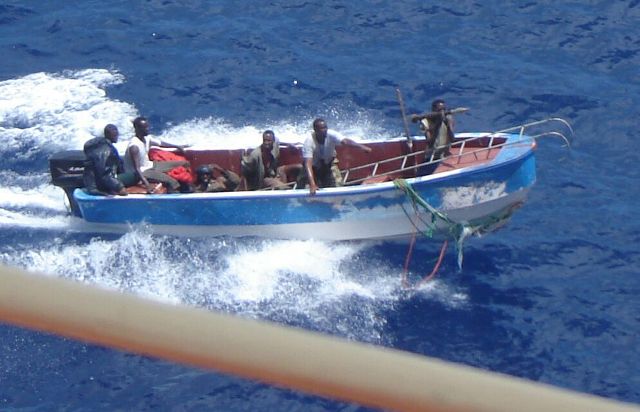Firms in Fed’s Beige Book Fret Over Any Lengthy Baltimore Port Closure
(Bloomberg) — The closure of one of the East Coast’s busiest ports after the collapse of Baltimore’s Francis Scott Key Bridge has so far not led to broad price increases,...


File photo of pirates off the coast of Somalia. Photo via IMO
By Dirk Siebels
While piracy has dominated the headlines in recent years, maritime security in Africa entails many other aspects. Illegal fishing, smuggling and human trafficking are just some of those, the growing offshore energy sector is another challenge.
Navies and coastguards in most African countries have long been regarded as poorly trained and equipped. Furthermore, ‘sea-blindness’ has been a problem for decades as security issues on land were prioritised. The picture, however, has begun to change, highlighted by the fight against piracy while other factors have been mostly overlooked.
Ghana is a good example. Since large oil deposits were discovered offshore in 2007, the country has embarked on an impressive procurement programme for its navy. It could even become a role model for other African countries with offshore hydrocarbon deposits such as Mozambique.
Improving the navy’s capabilities is only the first step as Commodore Steve Darbo, commanding flag officer of Ghana’s Eastern Naval Command knows. “Roles of naval forces are not always clear,” Commodore Darbo emphasised during the Africa Security and Counter-Terrorism Summit 2014 in London last week. Therefore, governments will have to develop integrated maritime strategies to define the roles of all agencies in the maritime domain.
In another presentation, Alex Vines from Chatham House pointed out that illegal fishing is “a major security issue” in countries around the Gulf of Guinea and elsewhere in Africa. He underlined that “national action is necessary” to translate speeches into operations at sea.
During a panel discussion, different perspectives on African maritime security could be observed. Peter Cook, CEO of the Security Association for the Maritime Industry (SAMI) explained that private security companies can provide much more than armed guards. With a new ISO standard which is going to be introduced this year, the role of the industry within the maritime environment will certainly be strengthened.
Commodore Darbo underlined that Ghana is indeed wary of armed guards in its territorial waters, a view that is shared by most African governments. Nonetheless, private security companies could provide other services, helping governments to monitor and secure their maritime domains more effectively than at present.
Regional cooperation is another important aspect for maritime security. During the conference in London, it was only touched upon briefly but the Maritime Organisation for West and Central Africa (MOWCA) has published encouraging news recently. In late February, MOWCA launched its information sharing centre to provide countries in the region with the most current data to improve the fight against piracy in the Gulf of Guinea. It seems that African governments are finally beginning to realise their offshore potential.
About Dirk Siebels
Dirk Siebels served as an officer in the German Navy and is still an officer in the naval reserves (current rank: Lieutenant). He is currently a PhD Candidate at the Greenwich Maritime Institute in London, conducting research on maritime security issues in both East and West Africa. Furthermore, Dirk is a Partner at Xiphias Consulting, a company specialising in political risk analysis and strategic communications. Contact Author
More From Dirk:
Join the gCaptain Club for curated content, insider opinions, and vibrant community discussions.


Join the 105,953 members that receive our newsletter.
Have a news tip? Let us know.
Access exclusive insights, engage in vibrant discussions, and gain perspectives from our CEO.
Sign Up




Maritime and offshore news trusted by our 105,953 members delivered daily straight to your inbox.



Essential news coupled with the finest maritime content sourced from across the globe.
Sign Up